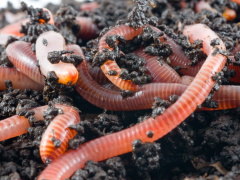Features
Earthworms don't like biodiesel
Date: 2020-10-14 11:36:39.0
Author: Jon Evans

Earthworms in soil.
Photo: mashe/Shutterstock.
The whole point of biodiesel may be that it's a greener, more sustainable, more environmentally friendly form of diesel, but try telling that to earthworms. In a recent study, reported in a paper in Scientific Reports, a team of Polish scientists found that biodiesel actually has a greater detrimental impact on soil organisms than conventional diesel.
Spills and leakages at both small and large scales can cause fuel to make its way into the soil. But whereas the effect of petroleum-based fuels such as diesel on soil and soil organisms has been widely studied, much less is known about the effect of biofuels such as biodiesel. To remedy this, a team of scientists led by Małgorzata Hawrot‑Paw at West Pomeranian University of Technology decided to compare the effects of diesel and biodiesel on various soil organisms, including microbes, plants and earthworms.
The scientists took soil samples, each weighing 2kg, from an agricultural station at West Pomeranian University of Technology and sprayed them with diesel or one of two biodiesels, comprising a commercial biodiesel and a biodiesel produced in their laboratory from rapeseed oil and methanol. The fuels were sprayed so that they ended up accounting for either 5% or 15% of the dry weight of the soil samples, while a control sample wasn't sprayed with any fuel.
After incubating the soil samples for 28 days, they investigated what types of microbe were present by adding soil from the samples to a range of culture media known to favour the growth of specific types of microbe, including general bacteria, fungi, cellulolytic microbes and the bacterium Pseudomonas fluorescens. They also investigated how well seeds of two plants, sorghum sugar (Sorghum saccharatum) and white mustard (Sinapis alba), grew in the various soil samples over the course of three days, and the survival rate of earthworms (Eisenia fetida) in the samples over 14 days.
They found that adding diesel and biodiesel to the soil altered its microbial population. Compared to the control sample, the number of bacteria and fungi tended to increase, presumably because they were able to feed on the hydrocarbons in the diesel and the fatty acid esters in the biodiesel, but the numbers of other microbes often decreased, especially in soil contaminated with biodiesel. Rather concerningly, these decreases were seen in many microbes known to be important for soil health, including actinomycetes and P. fluorescens, which play a role in breaking down organic matter and controlling plant pathogens.
In general, biodiesel had a greater detrimental impact on microbe numbers than diesel. Apart from bacteria and fungi, soil contaminated with biodiesel generally contained lower numbers of the different types of microbes than soil contaminated with diesel, although the numbers also depended on the concentration.
The same was true for plant growth and earthworm survival. Both plants grew more poorly in soil contaminated with biodiesel than soil contaminated with diesel, as measured by percentage of germinating seeds and root length, although they grew best in the control soil. Meanwhile, earthworm mortality was much higher in the contaminated soil, and was highest in the soil contaminated with biodiesel. While only a few earthworms died over the course of 14 days in the control soil, all the earthworms died in soil contaminated with biodiesel at a concentration of 15%.
Hawrot‑Paw and her colleagues conclude that while soil organisms vary in their sensitivity to the fuels, biodiesel generally caused more adverse effects than diesel, with the laboratory-produced biodiesel actually causing the worst effects. This came as rather a surprise, because commercial biodiesel contains various additives, including anti-microbial additives, that might be expected to have detrimental effects on soil organisms. But Hawrot‑Paw and her colleagues wonder whether the laboratory-produced biodiesel was more prone to breaking down in the soil and releasing methanol, which is known to be toxic to many organisms.
The views represented here are solely those of the author and do not necessarily represent those of John Wiley and Sons, Ltd. or of the SCI.
Displaying 2 keywords used to tag this article:
- Jules Audemars-Australia Best Quali
- DG6582 Mens Moncler Down Jackets Gr
